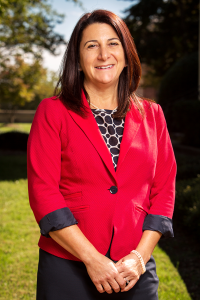
Leah Kraus jumped up and down with excitement. It was an otherwise ordinary day in 1990, and Kraus, a new teacher, had just walked into her first high school computer lab full of PCs.
While technology’s role in education has dramatically changed in the intervening twenty-five years, Kraus’s passion has not. As her career evolved from introducing computers to middle schoolers through the Oregon Trail game to implementing videoconferencing and wireless technologies in her current job as CIO of North Carolina Central University, her enthusiasm has remained steadfast. Much like she did in earlier roles, Kraus is now proactively using technology to improve students’ learning environments.
Kraus calls herself a “CIO by accident.” Growing up, she always wanted to become a teacher, and she eventually did. After earning a bachelor’s degree in office-systems administration from the University of North Carolina at Greensboro and then beginning her career at a software company, she found her love for teaching while working as a trainer and office manager there. In 1990, she earned her teaching certificate and landed a job as a high school business teacher.
“Teaching is my first love, and I just happen to be one of those people who understands applications,” she says. “I can see a software application once or twice and pretty much be able to maneuver around it.”
School Stats
Specializing in undergraduate majors of criminal justice, family and consumer science, and business administration, North Carolina Central was the first public liberal-arts institution for African Americans in the country and now serves a diverse student population.
37
Number of master’s degrees offered
15:1
Student-to-faculty ratio
Notable alumni
André Leon Talley, fashion icon and former Vogue editor-at-large; Larry Black, Olympic gold medal sprinter
So, it was a natural fit for Kraus to take over the high school’s new computer lab, where she showed teachers and students how the computers could help them learn a variety of subjects. The school’s population was largely composed of minorities and was a center for students who spoke English as a second language. Computers, Kraus says, removed barriers and served as an equalizer among students with varying abilities. For example, she helped English students get excited about writing by having them type on the computers.
“For me, that was really just an enlightening and empowering experience, to show the students the value of the technology, not just for technology’s sake,” she says. Kraus went on to work at a middle school and later served as CIO of Guilford College and interim CIO of the University of North Carolina Wilmington before joining North Carolina Central, a historically black university in Durham.
Kraus oversees a team of about sixty employees and twenty students who are responsible for providing services, solutions, and strategic direction to meet technology needs of students, faculty, and staff. Her team manages network and server infrastructure, telephony, video, desktop support, application support, student computer repair, wireless service, web development and content management systems, and enterprise systems applications.
“If it travels over a wire and isn’t electricity, we have something to do with it,” she says, adding that she also leads wireless and cloud solutions and IT vendor-relationship management.
When Kraus joined NCCU in February 2014, her first priority was reacting to baseline needs across campus, namely updating the wireless registration system that required users to log in every day. By August and September, the IT team was implementing a new network-registration system and guest portal. With that out of the way, Kraus is turning her focus to transforming the department—from reactive to proactive.
Kraus meets with students to determine what IT solutions could help create the classroom of the future or other enhanced services, and she asks faculty to let her know about IT services and support they’re going to need in the coming years. She encourages them to “come to us and push us, challenge us to meet those needs so that when it is something that all faculty want, we’ve already heard it.”
“We’re not reacting,” she says. “We’re partnering with you and creating the solution as you’re needing it.”
Creating a classroom of the future is a huge initiative for Kraus. One project would allow professors to videoconference with experts from any location around the world. The University already has the capability to do that, but not all classrooms are equipped with the necessary technology. She’s also working on intentional collaboration spaces across campus where faculty, staff, and students can launch a videoconference from the station on their own.
Kraus leads her team much like she taught her classes: by supporting and empowering them through partnerships and collaboration. A more authoritarian leadership style, she says, isn’t such a good fit—she’s tried it before. “I’m barely five feet tall. So when you walk into a high school classroom barely five feet tall and you try to yell—and your class is mostly taller than you are—you get a lot of laughs,” she says.
Though she’s outwardly energetic and values her students’ and colleagues’ ideas, Kraus can also be firm when necessary. That’s key when her passion lies in imparting knowledge on students and colleagues and seeing the lightbulb turn on for them.
“Just seeing that connection drawn is something that is very energizing to me,” she says. “Whenever I get to do that, it’s the best day that I get to have.”
